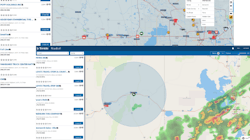Trimble revamps TMT Road Call to help fleets solve breakdowns quicker
In an effort to reduce unexpected downtime, Trimble has updated its TMT Road Call solution to streamline fleet maintenance and service for managing roadside vehicle breakdowns. The cloud-based event workflow ties in with Trimble’s TMT Fleet Maintenance asset maintenance solution.
The latest TMT Road Call version consolidates all unforeseen maintenance management into a single platform, integrating vehicle locations, service providers, work orders, weather, and more that can reduce stranded driver phone calls from the roadside and increase uptime, according to Brian Mulshine, Trimble’s senior director of maintenance and TMT product management.
See also: Economy continues to be trucking’s top concern going into 2025
At the 2024 American Trucking Associations' Management Conference & Exhibition in Nashville, he noted that some fleets using the new TMT Road Call system are seeing a 30% improvement in uptime.
“It helps them communicate faster and get the work into the shop and out,” Mulshine said. “It also reduces the number of communication transactions.”
This can be particularly helpful for large fleets with call centers to help truck drivers manage roadside and other assistance while in the field—and it’s valuable for smaller fleets that either outsource their call center assistance or lack the workforce of their competitors.
“That’s a very high cost,” Mulshine explained. “So now I’m giving a fleet the tools so they don’t have to go to a third party to support them.”
How TMT Road Call works for fleets
With TMT Road Call, carriers can see disabled vehicles in their TMS, determine the best maintenance service provider, and generate repair orders within a single, map-based user experience.
Mulshine explained this saves fleets time and reduces the need to manage multiple portals and systems. By combining Trimble’s commercial map visualization and maintenance technology, TMT Road Call streamlines fleet maintenance workflow, making management more efficient.
Some carriers manage hundreds or even thousands of breakdowns annually. According to Trimble, nearly 80% of fleets outsource maintenance services. Instant access to an extensive network of external, local service providers is critical for any fleet, Mulshine noted.
By integrating Trimble Places, Trimble’s database of more than five million commercial service locations, the transportation technology company said that TMT Road Call streamlines the process of getting a vehicle from breakdown to back on the road in a single, connected workflow—all while reducing the time, cost, and stress associated with managing these unexpected events.
With TMT Road Call, fleet maintenance managers can:
- Identify disabled vehicles and locate best-fit service centers: Based on a live map-based interface, complete with Trimble’s map data and precise polygonal geofences, TMT Road Call provides access to an extensive network of connected service centers, towing providers, tire vendors, truck stops, dealers, and internal shop locations with truck-safe and truck-legal routing available.
- Determine best approach for vehicle and driver: Based on vehicle status and predicted weather intelligence, which is available directly within the TMT Road Call map visualization.
- Initiate and streamline repair service requests: TMT Fleet Maintenance electronically creates a workflow that eliminates the need to call a dealer or service center. Integrated Connected Maintenance service center locations include Travel Centers of America, Daimler Truck, International Truck, and IC bus dealers.
- Unlock data power: TMT Fleet Maintenance seamlessly integrates and overlays vendor metrics such as repair count and vendor ratings on the map to uncover insights and help fleet managers make informed decisions.
Other features included in TMT Road Call are:
- A case management system to log and record road call events.
- The capability to view equipment specifications, scheduled PMs, failed inspections, and pending work.
- Customizable statuses to track equipment updates.
- Downtime measurements.
- API access for carriers to connect drivers and electronically submit a road call case.
About the Author
Josh Fisher
Editor-in-Chief
Editor-in-Chief Josh Fisher has been with FleetOwner since 2017. He covers everything from modern fleet management to operational efficiency, artificial intelligence, autonomous trucking, alternative fuels and powertrains, regulations, and emerging transportation technology. Based in Maryland, he writes the Lane Shift Ahead column about the changing North American transportation landscape.

